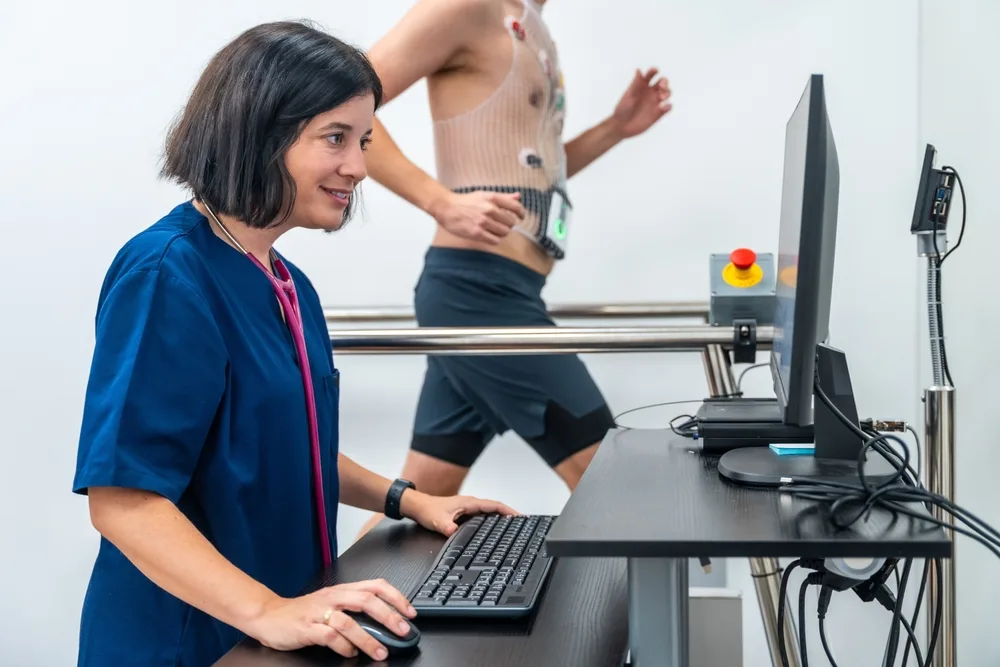Dobutamine Stress Echocardiogram (DSE)
Dobutamine Stress Echocardiogram (DSE): Your Trusted Partner in Advanced Cardiac Imaging in Kharghar, Navi Mumbai
Understanding the Dobutamine Stress Echocardiogram (DSE)
A Dobutamine Stress Echocardiogram is a specialized imaging test that helps determine how well your heart and its blood vessels are working. For patients who cannot exercise on a treadmill, this test provides a safe and effective alternative by using a medication called Dobutamine.

Scientific & Medical Context
Dobutamine is a sympathomimetic amine that primarily stimulates the beta-1 adrenergic receptors in the heart. This action mimics the effects of exercise by increasing the heart rate, myocardial contractility, and overall cardiac workload.
During this controlled stress, we use advanced echocardiography (ultrasound of the heart) to visualize the heart’s response. In a healthy heart, all sections of the heart muscle (myocardium) will contract more forcefully. However, if a coronary artery is significantly blocked, the area of the heart muscle it supplies will not receive enough oxygen-rich blood during stress. This “ischemia” manifests as a regional wall motion abnormality (RWMA), where that specific segment of the heart wall appears to contract poorly (hypokinetic), not at all (akinetic), or even bulge outwards (dyskinetic) compared to the resting images. Our cardiologists meticulously analyze these changes to diagnose Coronary Artery Disease (CAD).
DSE Protocols & Profiles Offered
Standard Ischemia Evaluation DSE
This is the most common DSE protocol. Dobutamine is infused intravenously in gradually increasing doses (stages) to incrementally raise the heart rate to a target level. Echocardiographic images are acquired at rest, at each stage, and during the recovery phase to detect ischemia.
Myocardial Viability Assessment DSE
This protocol is for patients with known heart muscle damage to determine if the tissue is “viable” (alive but hibernating). This information is crucial for planning procedures like angioplasty or bypass surgery.
DSE for Valvular Heart Disease Assessment
In cases like severe aortic stenosis with poor heart function, a DSE can help differentiate true severe stenosis from “pseudo-severe” stenosis, providing critical data for surgical planning.
Step-by-Step DSE Procedure Guide
In Simple Terms (For Patients)
- Preparation: You’ll change into a gown, and our technician will place small sticky patches (electrodes) on your chest to monitor your heart’s rhythm (ECG).
- IV Line: A small intravenous (IV) line will be placed in your arm to administer the Dobutamine medication.
- Resting Images: While you lie on your left side, we’ll take a first set of ultrasound images of your heart. This is your “baseline” scan.
- Medication Infusion: The Dobutamine will slowly drip through the IV. You may feel your heart beating faster and stronger, similar to when you exercise.
- Stress Images: We will continuously monitor you while taking more ultrasound images as your heart rate increases.
- Recovery: Once the target heart rate is achieved, the medication is stopped. We continue to monitor you and take final images until your heart rate returns to normal. The entire test typically takes 45 to 60 minutes.
DSE Test Prices
| DSE Test Profile | Description | Price (INR) |
|---|---|---|
| Dobutamine Stress Echo (Ischemia Protocol) | Standard test for detecting blockages in coronary arteries. | ₹ 7,500 |
| Dobutamine Stress Echo (Viability Protocol) | Low-dose protocol to assess the health of heart muscle after a heart attack. | ₹ 8,000 |
| DSE with Contrast (Advanced Visibility) | Utilizes a contrast agent for enhanced image clarity in difficult cases. | ₹ 11,000 |
*Prices are indicative and subject to change. Please confirm at the time of booking.
Why Choose Henotic Diagnostics?
- ✔ Expert Team: Our DSEs are conducted by senior MD/DM Cardiologists with extensive experience.
- ✔ Latest Technology: We use advanced ultrasound systems like the GE Vivid T9 for superior image quality.
- ✔ Patient Safety First: The procedure is performed in a controlled environment with full emergency support.
- ✔ Comfort & Care: Our staff are trained to ensure you are comfortable and informed at every step.
- ✔ Swift & Reliable Reporting: We provide quick and accurate reports to facilitate timely medical decisions.
Patient Feedback
“The entire DSE procedure at Henotics was smooth and professional. The doctor explained everything clearly, and the staff was very caring.”
– R. Sharma, Vashi
“I was nervous about the test, but the team at Henotic Diagnostics made me feel very comfortable. The facility is clean and equipped with modern machines.”
– A. Patel, Kharghar
“Very efficient service. The booking was easy, and the report was detailed. The cardiologist took the time to discuss the findings with me. A trustworthy diagnostic center in Navi Mumbai.”
– S. Iyer, Belapur
Frequently Asked Questions (FAQs)
Q1: Is the Dobutamine Stress Echo painful?
A: The test itself is not painful. You may feel a slight prick from the IV needle. The medication may make your heart beat fast and strong, but this sensation is temporary.
Q2: How long does a DSE test take?
A: The entire process, from preparation to recovery, usually takes about 45 to 60 minutes.
Q3: Is the DSE test safe?
A: Yes, it is a very safe procedure when performed in a controlled medical setting under the supervision of a cardiologist. We monitor you closely throughout the test.
Q4: Why do I need a DSE instead of a Treadmill Test (TMT)?
A: A DSE is recommended for patients who cannot exercise due to conditions like arthritis, severe obesity, or other physical limitations, or if their baseline ECG makes a TMT difficult to interpret.